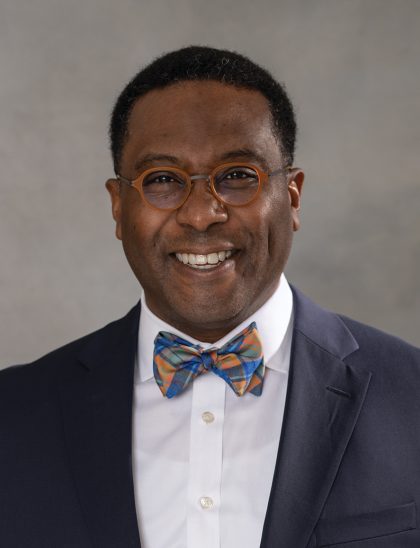In this month’s At the Helm, our Senior Vice President Suzanne Battit sat down with C. Andrew (Andy) McGadney, the recently appointed President of Knox College in Galesburg, IL. Suzanne and Andy discuss how to gain trust and create change as a new leader, what the higher education landscape looks like today, and his hopes for Knox’s future.
Suzanne: You have had an impressive career in higher education. What drew you to Knox?
 Andy: One of the biggest draws was my love for the liberal arts education. I’m a product of a liberal arts education, and I have worked at a number of liberal arts institutions, including my alma mater Wesleyan University, as well as Clark University and Colby College. I’ve always seen the value of a liberal arts education, so to have the opportunity to experience that and offer it to students at Knox College was very exciting.
Andy: One of the biggest draws was my love for the liberal arts education. I’m a product of a liberal arts education, and I have worked at a number of liberal arts institutions, including my alma mater Wesleyan University, as well as Clark University and Colby College. I’ve always seen the value of a liberal arts education, so to have the opportunity to experience that and offer it to students at Knox College was very exciting.
I also loved the idea of being part of a small community. It means you can have an impact everywhere you go. Knox is not the kind of place where the president is unknown. I can talk with our students, faculty, and board, visit our athletic facilities, theatre department, and really anywhere in Galesburg – and I feel like a part of the community. It’s a powerful thing to be embedded in this way.
And that speaks to the people of Knox; they are amazing. During my interview process, I quickly learned that the College’s faculty and staff live right here in Galesburg. They aren’t commuting to campus from other cities. They’re here every day, inviting students to their homes for coffee and dinner. I really valued that sense of community. Our student body is also hugely diverse. 35% are students of color, 16% are international, and more than 30% are first generation. Knox’s commitment to accessibility means a lot to me.
Lastly, Knox’s board of trustees was open to—and seeking—change. I felt like we could be true partners in not seeing our institution as a slow-turning ship but rather as an adaptable institution that can move quickly, innovate, and take advantage of opportunities to create real change. For all of these reasons, Knox felt like a perfect fit.
While earning an Ed.D. in higher education management from the University of Pennsylvania, you wrote your dissertation on “Crisis Management at Small Liberal Arts Colleges: Perspectives on Presidential Decision Making.” That feels especially relevant as higher education leaders nationwide strive to protect the health of their communities while continuing to deliver exceptional educational experiences. What lessons/strategies are you drawing on?
There were a number of key findings that I think about regularly these days. First, one of the clearest takeaways was how much leadership truly does matter and makes a difference. The presence of a leader greatly impacts how an institution is able to navigate a crisis.
Second was the importance of having a crisis planning culture. Thinking regularly about what you would do if various crises occurred makes it a lot easier when a real crisis does happen. It means you’re accustomed to being mobile and changing gears, that you know who to call upon and when.
Unsurprisingly, the third takeaway was that effective, clear, and prompt communication makes all the difference. Communicate, communicate, communicate. It’s key. It’s been a top priority of mine during COVID – and focusing especially on when to communicate which information and whose voice to use when we do. I didn’t cover this extensively in my research, but we should all be thinking about how to use social media in our communications, as well. It’s important to consider where our constituents are most active and the best way to get a message to them.
A fourth finding was the importance of high-performing teams. You need to have people who are knowledgeable of their own roles but can also pivot to tackle any situation that might arise – I feel lucky to have that at Knox.
Lastly, I saw time and time again the need to lead with transparency to gain trust. Being transparent about the decisions you are making and why will help your community trust what you’re saying. At Knox, we are partnering with three experts—two infectious disease doctors and an immunologist—to create policies and mandates for our community. We’re listening, learning and making decisions, and we are regularly communicating this information back to our community members. Does this mean that everyone agrees with our decisions? No, but at least they can see that we’re being thoughtful and thorough.
We’re now nearly two years into the pandemic. In your eyes, how has COVID permanently altered the higher education sector – for better or worse?
I think there are certainly silver linings, if you will. The use of technology has been game-changing. My presidency was announced late February 2021, and my first day as the 20th president of Knox was July 1st. During those four months in between, I must have met with 200+ individuals all through Zoom. Having the ability to have meaningful Zoom sessions with 4-5 trustees, staff, faculty, or community members at a time was invaluable. I was able to engage in a meaningful way, ask questions, and discover what mattered most to them. I wouldn’t have been able to connect with so many people if these meetings were all held in person. So, that was greatly beneficial.
I’m also grateful for how the pandemic has taught us to be nimble and make decisions quickly. Decisions that may have taken us months pre-pandemic are now being made on the turn of a dime. I think it’s an important lesson for the higher education sector, and if we can continue to do our work with this agility post-pandemic, that could be powerful.
Of course, there have been many tough aspects of the pandemic, too. On our campus, I see issues around mental health and wellness. I think our students, staff, faculty, and families are suffering. The fact that there is such a great need right now—and that our mental health professionals are stretched so thin—is a real challenge.
I think the pandemic has also revealed how vulnerable higher education is as a sector. There were reports of institutions closing pre-pandemic, but I think the pandemic has pushed that knowledge to the forefront. I still believe that the U.S. educational system is the best in the world because of all the options that prospective students and families have, but it also means it’s a highly competitive landscape. I hope the pandemic has driven us all to think about how we might deliver our services differently so we can endure for a long time.
While at Colby and Clark, you played a significant role in strengthening the institutions’ advancement programs. What role do you see fundraising playing in Knox’s future and success?
All institutions only have a few levers that we can pull. There’s the enrollment lever: at Knox, we’re always trying to think about how to create a greater demand for a Knox education. There’s the endowment lever: you’re always trying to grow the endowment and see a return that’s beneficial to your budget. And there are also additional revenue streams—things like summer programs, etc.—which have a more marginal impact but are still important.
The biggest lever, though, is the ability to raise funds from alumni, parents, friends, and community members. That’s where you can create transformative opportunities and initiatives that will benefit everyone. I think one of the reasons why my candidacy for this role was looked at favorably was my background in fundraising. I love finding the synergy between a donor’s interests and an institution’s goals, and I’ve always enjoyed asking for donations when I know how great of an impact the gift will have on the entire community. It’s a beautiful thing when a donor knows they have made a fundamental difference in how a place thrives and will endure for years to come.
My hope is that we’re able to develop new, creative, and inspiring initiatives that our donor community will not only love, but also jump behind more than ever before. And I know this will happen – it’s just a matter of time. I’m looking forward to partnering with the Knox and Galesburg community in this way.
You assumed the role of President this past July. When you reflect on your first 6 months at Knox, what have you enjoyed the most? And now, what are you looking forward to the most?
I shared earlier on in our conversation that the people of Knox drew me here, and over the past 6 months, that feeling of community has only deepened. It’s been great to form those personal and genuine connections. I’m really enjoying having the opportunity to engage with our community members – and to show them through my actions that the decisions I’m making are in the best interest of the long-term success of the institution. It’s important to me to communicate that I’m not a leader who is here for my own glory nor am I solely focused on the interests of a particular person, department, or initiative. I’m invested in the betterment of us all. I think once people are able to fully see that, we will have even greater momentum than what we have already started to create.
I’m also looking forward to a time when I’m able to travel to other cities and across the world to meet with alumni, parents, and prospective students. I think getting to spend time with people in their spaces will be really meaningful.
One last question – what advice would you share with fellow new leaders?
My first piece of advice is to listen. Listen, listen, listen. When you first come in, it’s so important and the best way to learn the culture and what really matters to your community. Of course, you will want to make changes, but taking the time to understand why things are the way they are is just as important as thinking about what could be done differently. Plus, knowing the history is always helpful in charting a future.
I would also say invest in your community. Invest your time and talent. Before you can fundraise or solicit gifts, it’s important to display your own commitment. People will see you’re not just there to hold a seat.
Lastly, I would encourage other new leaders to be vulnerable. Show your true self. Be open and you will find that others will reciprocate.

